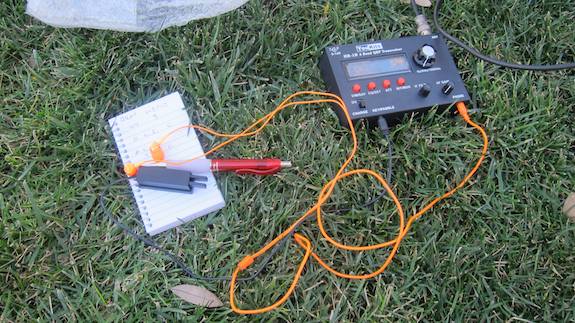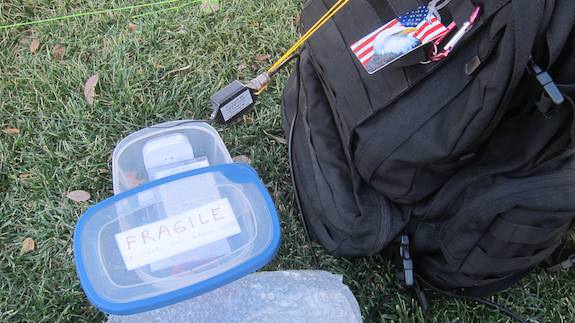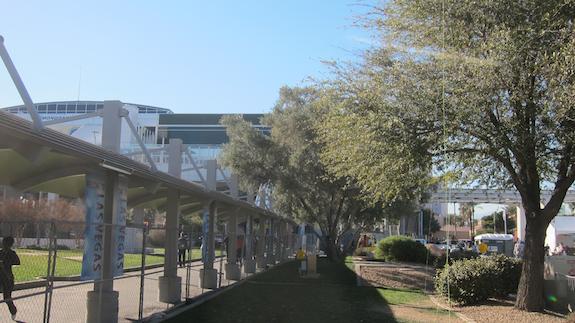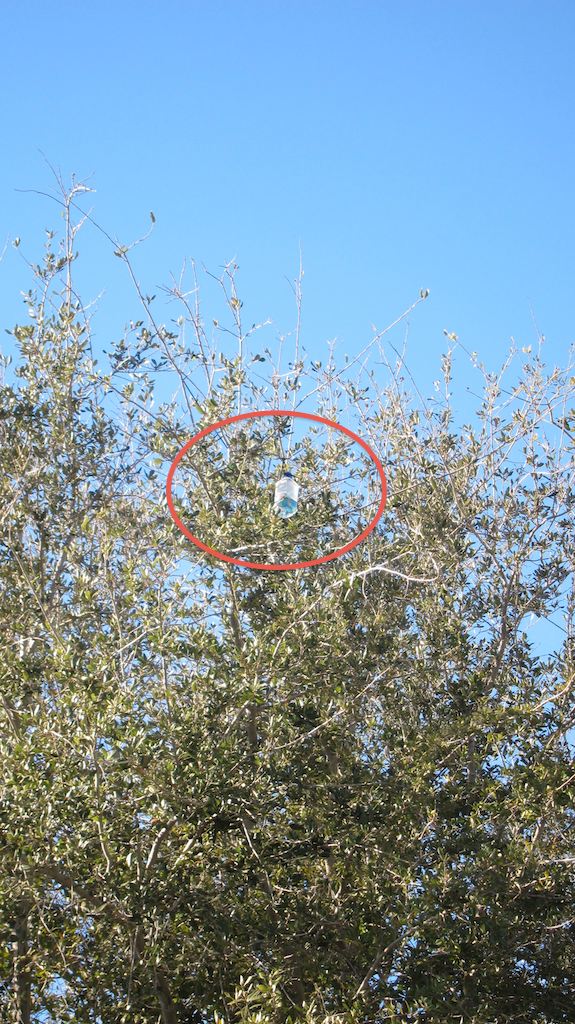It was a warm, sunny, 70 F-degree day in Sin City on January 22, 2014.
I’ll remember the day, the place and everything around me just like that night in my father-in-law’s basement where I stole the first kiss from my wife.
You may think I’m nuts, but traveling 2,731 miles with all my tiny radio equipment to make a QRP QSO for the first time will do that to a fellow. QRP is a Q-sign acronym that’s used between radio operators asking if they should reduce power. It’s loosely used among a small group of ham radio operators that prefer to transmit at power levels of 5 watts or less.
Once you do that, say transmit at 1 watt and the signal goes thousands of miles and is heard by another operator, you can get hooked. Anyone can blast a signal at 50, 100 or even 500 watts. What’s the challenge of that?
A QSO is another Q-sign acronym that stands for a completed two-way communication between two radio operators.
Just six weeks before I received in the mail a used, but in mint condition, HB-1B quad-band transceiver. It’s a dandy little radio that allows you to do ham radio from inside your home, on top of a mountain or anywhere in between. This little rig is compact, easy to operate and rugged.

You can see the HB-1B in the upper right corner. It’s a superb transceiver. Photo Credit: Tim Carter 2014
My mentor, Jim Cluett – W1PID, got me hooked on outdoor radio months before. I lusted being able to do what he does each week when the weather cooperates. He specializes in QRP outdoor radio and since I love being outdoors too I was immediately attracted to this aspect of ham radio.
“Guess what? I’m going to the World of Concrete show and I’m going to take my HB-1B rig with me,” I mentioned to Jim about a week before I left for Vegas.
“Would you want to try to do a QSO with me?”
“Sure.” Jim’s a firm believer in less said is better. He’s a master at many things including wry humor and masking his true emotions. Every now and then I’m able to break through his defenses and something I say or do elicits an extended belly laugh.
We agreed that I’d scout a location once there and let him know when I’d be set up and on the air. I was to arrive in Vegas on Tuesday afternoon around 1:30 p.m PT and my afternoon and evening were booked solid with a media event put on by Bosch Tools. They were hosting my visit to the show and I was honored and excited about seeing their new tools.
Because of the three-hour time zone shift, I knew I’d be up long before dawn the next morning. Sure enough, I popped out of bed at 4:05 a.m. PT. The only reason I wasn’t out of bed at 3 a.m. was because I had stayed up until about 10:30 the night before attending the private dinner put on by Bosch Tools. I was pretty tired having been up for almost 21 hours.
My plan was to scout the pool area at the Mirage casino/resort where I was staying, but it didn’t open until 10 a.m. I had to be at the convention center by 9:15 a.m. so that was out.
My HB-1B, the roll of microcord to hoist up the antenna, my endfedz multi-band thin-wire antenna, headphones, etc. were all in a nice compact tupperware container ready to stuff into my backpack. My Pico paddles were in their own small plastic box to protect the precision tool.
Bosch Tools had given me the day before a welcome bag filled with goodies including a 16-oz bottle of Fiji water. That’s exactly what I needed to get my microcord up into a tree to pull up my antenna. I was ready to roll!

Here’s the tupperware container that held everything except my Pico paddles. Photo Credit: Tim Carter 2014
I had some business to attend to at the Las Vegas Convention Center, the site of the World of Concrete show. Around 3 p.m. I was finally able to get on the air.
The only trees I could locate that might work were these bushy ones near the covered walkway that lead from the South Hall to the overhead monorail mass-transit train that stops at the convention center. This was not ideal because so many people were walking past me. Fortunately temporary chain-link fencing separated me from them.

Here’s where I set up. The convention center is behind me about 150 feet away. You can see my lime-green microcord draping in the tree. Photo Credit: Tim Carter
It was time to set up. I unpacked all my gear and got ready to throw the 1/3-full Fiji water bottle over the tree. I didn’t do so well. After three attempts, my bottle was snagged by the newly named Tree of Death. The bottle was not coming down without a chainsaw.

You can see the bottle stuck in the tree in the red oval. Time for a rock. Photo Credit: Tim Carter 2014
Fortunately I had tied the microcord rope loosely to a larger diameter parachute cord and I was able to get my microcord back out of the tree. I looked for a rock and promptly tied the cord to it and whipped it up into the tree. I was able to tug on the microcord and get the rock to drop to the ground.
In a few moments I had my endfedz multi-band antenna up in the tree. It was by no means perfect because I was hesitant to pull it too close to the branches of the Tree of Death. I could see how the antenna could be snagged with ease.
I was left with a pathetic sloper antenna that had the shape of a rough question mark. I was convinced my antenna would not work well. Jim had told me time and again I’d get the best results if the antenna was straight up and down. Well, that’s not happening today for me.
After connecting the antenna to the HB-1B, it only took a few minutes to connect my earphones and my sweet Pico micro paddles to the rig. I feel it’s mandatory to have the antenna connected to the radio before powering it up. I don’t want to risk transmitting by accident without the antenna to absorb the energy.
I had the radio set to 20 meters and went to 14.050. I had texted Jim about 15 minutes earlier telling him I was close to being on the air. He texted back asking me where I’d be on 20 meters. I originally sent 14.050. He was already in his shack waiting for me.
It was a little noisy so I scooted down to 14.045. I quickly texted Jim telling him to move to that frequency.
I was filled with excitement. Would he hear me? Could I hear him? Would the band be open? Did I have enough power to make it back to New Hampshire where he was sitting in his shack?
It was time for my first QRP outdoor QSO.
I transmitted: “W1PID DE W3ATB K”
A second later I heard, “RR 3ATB DE W PID K”
OH MY GOSH! IT’S WORKING!
His signal was faint and I was only catching about 60% of his transmission as the signal faded in and out. But I was HEARING him! How cool was that? What are the chances we’d both hear each other?
I was transmitting at 4.5 watts and he was blasting out at 75 watts to try to get to me.
I gave him a 449 RST and he gave me back a 449, or at least that’s what I was able to extract from the the ether.
I then heard him send in the fading signal, O L D C. Later on the phone he told me he sent: COLD COLD COLD because it was bitter cold back home.

Here’s my small log book with the contents of the short QSO. You can see the small Pico paddles too. Photo Credit: Tim Carter 2014
That fast it was over. But I HEARD HIM!
I was bubbling with joy. It was worth all the effort and risk. After the QSO was over, Jim called me on my cell phone. He was as excited as I was because he knows far more about ham radio than I do and realized it was simply amazing we could complete the QSO.
“It’s not uncommon for just one person to hear the other and the other hear nothing. It’s all a matter if that HF radio pathway is open,” Jim said.
He summed it up perfectly when he said matter-of-factly, “It’s all magic.”
Indeed it is – and that’s part of the attraction as far as I’m concerned. You never know who you’ll connect with and what might happen.
Jim told me before we hung up on the phone he was afraid he’d have to bail me out of jail as the convention center police might think I was some sort of terrorist. I was prepared with my wallet-sized copy of my FCC license, but even still in these times one never knows.
I can’t wait for the weather to break here in New Hampshire so I can get outdoors more often to operate the HB-1B. Fortunately I’ll be in sunny southern California the second week of February, 2014 on business.
I’m taking the HB-1B and all my gear. I plan to operate from a few mountain tops and from the beach of the Hyatt resort at Huntington Beach. A friend I’m visiting has his kite all ready to get my antenna up in the air at the beach and possibly on the mountains!
I hope you and I can do a QSO soon! Be sure to ask me if I’m QRP.
